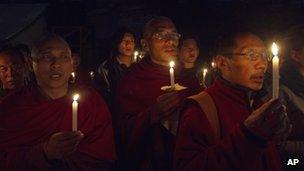Labrang monastery: Tibetan farmer self-immolates
- Published

A Tibetan farmer has died after setting fire to himself in north-western China, according to human rights groups.
It is the second self-immolation near the influential Labrang monastery in Gansu province in two days.
Pictures posted by the International Campaign for Tibet show Dorje Rinchen running down a street, his entire body covered in flames.
The Buddhist Labrang monastery is one of the most influential outside Tibet.
It was the site of protests by monks and nuns in 2008, following ethnic riots in the Tibetan capital Lhasa.
On Monday a herdsman burned to death outside a prayer hall at the monastery.
There was a further self-immolation at a nearby monastery in Gansu province on Saturday.
Religious freedom
More than 50 Tibetans, many of them monks and nuns, are reported to have set fire to themselves since 2009 in protests against what they say is China's repressive rule.
Beijing denies this and says Tibetans enjoy religious freedom.
On Wednesday the Chinese foreign ministry repeated Beijing's criticism of the Dalai Lama, the exiled Tibetan spiritual leader.
Its spokesman, Hong Lei told reporters: "To our knowledge most of the self-immolation cases in the Tibetan-inhabited regions are related to the instigation of the Dalai clique.
"In order to realise their separatist goals, the Dalai clique has incited some people to self-immolate. This is despicable and should be condemned."
The Dalai Lama and representatives of the self-declared Tibetan government in exile in India say they oppose all violence.
- Published22 October 2012
- Published18 April 2012
- Published13 October 2012